|
|
|
Sort Order |
|
|
|
Items / Page
|
|
|
|
|
|
|
| Srl | Item |
| 1 |
ID:
168823
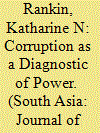

|
|
|
|
|
| Summary/Abstract |
In this article, we bring ethnographic insights from the contemporary moment of social and political transformation in Nepal to bear on troubling established understandings of corruption. We argue that corruption furnishes a productive site from which to interpret the relational space of state practice and to probe the ‘blurred boundaries’ of states, polities and markets in everyday lives. Reading corruption as a ‘diagnostic of power’, moreover, can help reveal intersecting and competing structures of power at work in ongoing processes of state construction and contestation. The argument is developed through an examination of three related and overlapping illustrations of public–private transgression, which we characterise as ‘impossible publics’, ‘consensus collusion’ and ‘patronage democracy’. Taken together, they speak to the diversity of practices commonly glossed as corruption, and their embeddedness in powerful mobilisations of affective communion and intimate relations of mutual obligation. We suggest in conclusion that engaging corruption as a diagnostic of power offers critical insights about the nature of, and possibilities for, distribution, political agency and planning. Overall, we make a case for the importance of disaggregating diverse practices of corruption in specific, socially embedded contexts in order to reveal possibilities for the meaningful redistribution of political power and opportunity.
|
|
|
|
|
|
|
|
|
|
|
|
|
|
|
|
| 2 |
ID:
168819
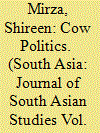

|
|
|
|
|
| Summary/Abstract |
This article explores the spatial politics of situating slaughterhouses at the margins of Mumbai city enacted by the sanitary civic state and the caste labour of the butcher community. While the sanitary state mobilises colonial discourses of sanitation that deem animal slaughter unhygienic and so needing to be located at the shifting periphery of the city, an ethnography of the Muslim sub-castes of mutton and beef butchers suggests that animal slaughter is a form of caste labour that involves cultivating hereditary skills of working with flesh, bone and blood, which the Mumbai butchers refer to as ‘karigari’ (artisanship). Their caste labour is resisting the reconfiguration of the meat trade, which they view as fragmenting the community’s control over their labour. By bringing theories of urban space, state and caste among urban Muslims into the conversation, the article describes the ways in which scientific and communal ideas of sanitation are consolidated along a continuum. It also describes the ways in which caste and religion condense along an axis to form analogous structures that are deployed by the beef and mutton butchers to resist these spatial shifts.
|
|
|
|
|
|
|
|
|
|
|
|
|
|
|
|
| 3 |
ID:
168826
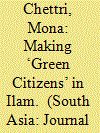

|
|
|
|
|
| Summary/Abstract |
Ilam municipality’s rapid transformation into Nepal’s ‘Green City’ illustrates a development strategy based on the aesthetic ordering of the urban environment. Aimed at creating environmentally conscious citizens, the implementation of green policies has created new platforms and modes of interaction between the state and its citizens and has simultaneously led to the formation of nascent environmental subjectivities. Ilam’s transformation highlights how environmental subjectivities are emerging and different kinds of citizenship are performed, contested and established.
|
|
|
|
|
|
|
|
|
|
|
|
|
|
|
|
| 4 |
ID:
168821
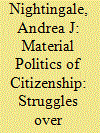

|
|
|
|
|
| Summary/Abstract |
Examining the boundaries of state–society–citizen–environment after the federal restructuring in Nepal, we ask how do people claim authority or citizenship rights? We theorise state power through the socio-environmental state framework as a set of socio-natural relations in the making, formed by struggles over authority, recognition and environment. Using qualitative data from Barpak, the epicentre of the 2015 earthquake, we capture the politics of natural resource governance that (re)emerged during earthquake reconstruction and local-level elections, illustrating how control over resources is negotiated, disputed, and inscribed in law (land titles and water sources) and landscapes (water sources, earthquake resettlement area, an open-air museum).
|
|
|
|
|
|
|
|
|
|
|
|
|
|
|
|
| 5 |
ID:
168824
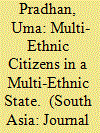

|
|
|
|
|
| Summary/Abstract |
In 1990, the Constitution of Nepal declared Nepal a multi-ethnic (bahujatiya) country. This newly transformed state promised better inclusion of marginalised groups through special provisions. How has this been operationalised, and what does this mean in practice for the members of the groups concerned? Drawing on fieldwork in the Nepal Foundation for Development of Indigenous Nationalities (NFDIN), this paper argues that the Nepali state’s moral and political obligation to address long-standing concerns about group-based inequalities has opened up intriguing new spaces to perform and redefine state–society relations. Within these new spaces, categories of difference are constantly invoked and experienced, where both the state and citizens come to co-constitute each other in a variety of new ways.
|
|
|
|
|
|
|
|
|
|
|
|
|
|
|
|
| 6 |
ID:
168827
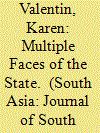

|
|
|
|
|
| Summary/Abstract |
This article focuses on conditions of prolonged uncertainty for people residing in a squatter settlement, a sukumbasi basti, in Kathmandu and the role assigned to the state in this. Inspired by theoretical debates on urban governmentality and based on longitudinal ethnographic fieldwork, the article shows how the threat of eviction has resulted in a permanent state of uncertainty, but also a pragmatic acceptance of the state of affairs which, over the years, has contributed to fostering a strong sense of belonging to the area.
|
|
|
|
|
|
|
|
|
|
|
|
|
|
|
|
| 7 |
ID:
168818
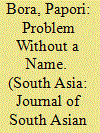

|
|
|
|
|
| Summary/Abstract |
This paper is about race and race relations in India with a focus on the experiences of violence and discrimination that people from India’s Northeast face in mainland India. This has become a ‘problem without a name’, generally articulated as a problem of cultural difference. The paper argues that the emphasis on cultural difference elides the issue of racism faced by India’s north-eastern subjects, whereby culture is a mere substitute for race. Institutional approaches to racism tend to rely on a biological understanding of race. The paper demonstrates the racial formation of the category ‘north-eastern’ through the processes of colonialism, nationalism and counter-insurgency. This approach shows the ways in which racism, classism and sexism work together in constituting the racialised, gendered and classed north-eastern subject.
|
|
|
|
|
|
|
|
|
|
|
|
|
|
|
|
| 8 |
ID:
168820
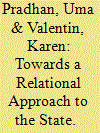

|
|
|
| 9 |
ID:
168817


|
|
|
|
|
| Summary/Abstract |
This article investigates Dalits’ dreams and desires for education in the United Provinces by examining hitherto unexplored records of the American Methodist Church missionaries and the Arya Samaj from the late nineteenth and early twentieth centuries. Focussed on the schools opened for Dalits and Dalit Christian converts by these two religious organisations, it explores the schools’ visions and objectives. The article presents the history of Dalit education beyond the existing dominant analytical frame of educational access and exclusion. It suggests that the mere inclusion of marginalised groups in educational institutions did not guarantee equality; rather, inclusion set in train a process for producing newer forms of exclusion, inequality and suppression. I argue that while these schools opened an important window for Dalit education in the region, the education offered was limited, hierarchical and practical. Both Christian missionaries and Arya Samajis saw Dalits primarily as a labouring community, and the education they offered reflected this thinking; it aimed at making Dalits productive, disciplined and loyal beings. Nevertheless, this limited education allowed Dalits to dream of a literate and dignified life and to pursue non-manual labouring careers.
|
|
|
|
|
|
|
|
|
|
|
|
|
|
|
|
| 10 |
ID:
168822


|
|
|
|
|
| Summary/Abstract |
Over the last several decades, new forms of targeted market development have been embraced as solutions to uneven development and market failures. The popular model of inclusive ‘value chain development’ aims to harness markets to address broader development agendas by means of pro-active, micro-market engineering by development experts. This paper examines how inclusive market-making interventions touch down in an agrarian district in Nepal. It focuses on the role of ‘development brokers’ who are enrolled as market engineers and charged with mediating the tensions between profit-oriented market logics and pro-poor goals. The paper argues that even as value chain development aims to depoliticise market failures, the new forms of state–market–society encounters entailed in market-making can also work to bring markets into view as objects of political practice.
|
|
|
|
|
|
|
|
|
|
|
|
|
|
|
|
| 11 |
ID:
168825


|
|
|
|
|
| Summary/Abstract |
This paper looks at the conflictual relationship between the Nepali state and its citizens through the history of the public libraries of Nepal. It seeks to explain the causal factors that led to the birth, growth and subsequent decline of Nepal’s public libraries. And it shows that the libraries set up and run by citizens were, apart from and more than performing a supplementary role in the country’s education system, also part of the nascent public sphere where ‘private people came together as public’. But since the country’s autocratic regimes wanted no social formations outside their direct purview, and the libraries were involved in creating ‘public opinion’, they were targeted by the state.
|
|
|
|
|
|
|
|
|
|
|
|
|
|
|
|
|
|
|
|
|